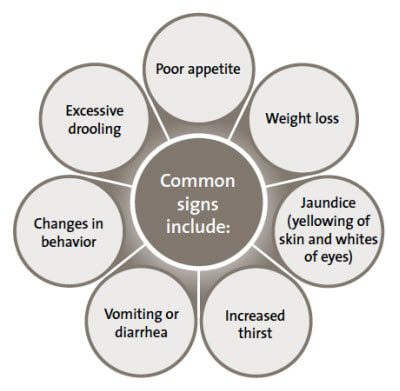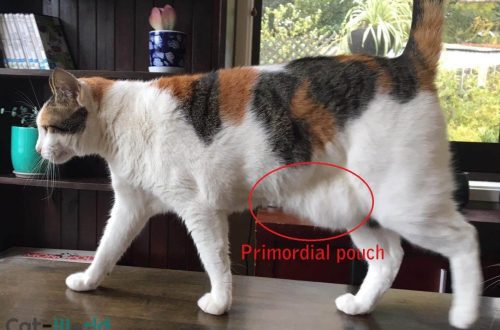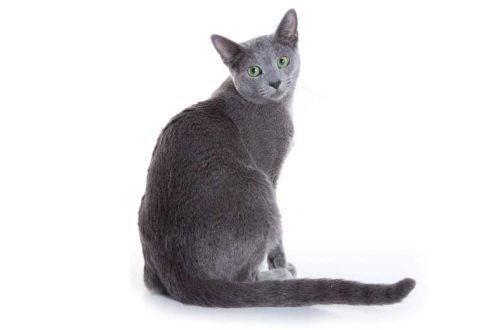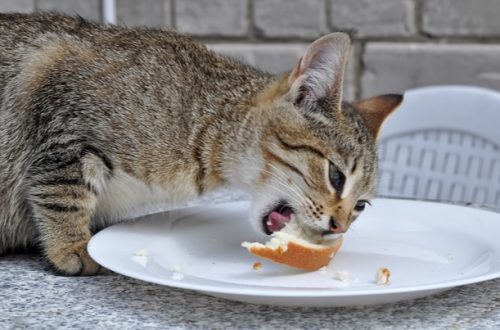
Arun Ẹdọ ni Awọn ologbo: Awọn okunfa, Awọn ami ati Awọn aami aisan
Awọn akoonu
Kini arun ẹdọ?
The liver is an extremely important organ that performs many functions, such as breaking down and converting nutrients, removing toxic substances from the blood, and storing vitamins and minerals. Since the liver is responsible for the excretion of various substances from the body, it is subject to a variety of negative external influences. Liver disease leads to inflammation of the liver, known as hepatitis. Left untreated, it can lead to loss of organ function as healthy liver cells are replaced by scar tissue in this condition. Diseases and damage to other organs and tissues can also adversely affect liver function.
Fortunately, liver diseases can be effectively controlled as well and their progression can be significantly reduced. Many cats continue to live happily years after diagnosis. Proper nutrition and regular consultation with a veterinarian is the key to treating your cat’s liver disease.
What can cause liver disease?
The following are some risk factors for liver disease in cats:
Ọjọ ori. Some diseases, including liver failure, are common in older cats
Irubi. Some breeds of cats, such as the Siamese, are often born with certain liver problems or have a predisposition to develop them.
Isanraju. Overweight cats are more likely to develop liver disease.
Medicines and chemicals. Medicines containing acetaminophen can cause liver damage in cats
Does my cat have liver disease?
The symptoms of liver disease can be very similar to those of other diseases. If you notice any of the following symptoms in your cat, contact your veterinarian for a complete examination of the animal.
Awọn aami aisan lati wa jade fun:
- Poor appetite or loss of appetite
- Ipadanu iwuwo nla
- àdánù pipadanu
- Jaundice (yellowing of the gums, whites of the eyes, or skin)
- pupọjù ngbẹ
- Ebi tabi gbuuru
- Awọn iyipada ihuwasi
- Apọju ti o pọ ju
- Loss of energy or depression
Other possible symptoms of liver disease include dark urine, pale gums, or fluid in the abdomen that could be mistaken for sudden weight gain. Your veterinarian may order various diagnostic tests to look for liver disease in your cat.
PATAKI. The symptoms of liver disease are not very specific, making them difficult to diagnose. If overweight cats stop eating, they can develop life-threatening complications. Cats that have lost their appetite for two to three days may develop liver lipidosis, a condition associated with excessive accumulation of fat in the liver that interferes with normal liver function. If your cat refuses to eat, contact your veterinarian immediately.
Pataki ti ounje
If your cat has been diagnosed with liver disease, you are probably wondering, “How do I care for her?” The treatment of any liver disease is aimed at giving the liver a “rest” and minimizing its workload, which is associated with the processing of fats, proteins, carbohydrates and drugs. It is especially important to properly feed the cat. Give her food with easily digestible carbohydrates, high-quality fats, and limited salt to control existing liver damage and improve liver function.
For an accurate diagnosis and proper treatment, always consult your veterinarian and ask them to recommend the best food for your pet’s liver health.
Ask your veterinarian:
- What foods should I not give my cat due to her health condition?
- Ask how human food can affect a cat’s health?
- Would you recommend Hill’s Prescription Diet for my cat?
- Ask about special foods for your cat.
- How much and how many times a day should you feed your cat the recommended food?
- Discuss what treats you can give your cat with the recommended food.
- Bawo ni yarayara awọn ami akọkọ ti ilọsiwaju ninu ipo ologbo mi yoo han?
- Can you provide me with written instructions or a leaflet with information about my cat’s liver disease?
- Kini ọna ti o dara julọ lati kan si ọ tabi ile-iwosan ti ogbo ti Mo ba ni awọn ibeere (imeeli/foonu)?
- Ask if your cat needs follow-up.
- Pato boya lẹta olurannileti tabi iwifunni imeeli yoo firanṣẹ si ọ.





